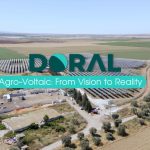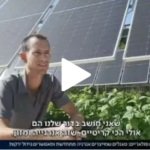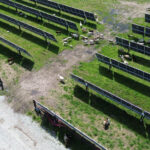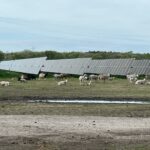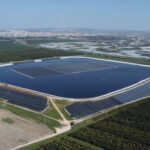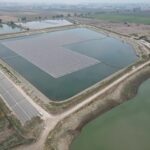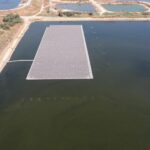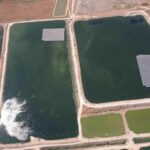-
- Developing and generating for our planet
- Doral’s Contribution to Reducing Emissions and Addressing for Climate Change
-
Innovation
Full chapter- Innovation
- A Leader in Israel’s Energy Storage Sector
- Doral Tech – Energy of Innovation
- A Bridge to Academia and Future Technologies
- Leading the Field of Dual-Use Renewable Energy Production in Israel
- Development of ‘Green Hydrogen’ Projects
- Development and Management of Environmental Infrastructure Integrated with Renewable Energy
- At the Forefront of Israel’s Green Electricity Market
- Reducing Water Consumption
- Preserving Biodiversity
- Waste Treatment and Promotion of Circular Economy
- Our Overall Environmental Impact – Greenhouse Gas Emissions Data
- Progress Against Targets
-
-
- Responsible and Ethical Management of Our Business
-
Corporate Management at Doral
Full chapter - Corporate Governance for ESG
- Business Ethics and Compliance at Doral
- Preventing Bribery, Corruption, and Conducting Internal Audits
- Information Security and Business Continuity
- Risk Management
- Responsibility in Our Value Chain
- Progress Against Our Targets
-
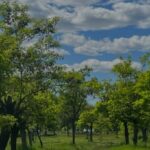
Leading the Field of Dual-Use Renewable Energy Production in Israel
0
Over 9,000 dunams (approx. 2,224 acres) of dual-use photovoltaic facilities, connected and in various stages of planning
0
MWp
of dual-use facilities in various stages of planning
One of the main environmental ‘costs’ of initiating solar facilities is the extensive land areas required and the price of developing extensive infrastructure in open spaces. To address this, Doral has committed to developing dual-use solutions, which include solar technology-based electricity generation facilities installed on rooftops, reservoirs, fences, interchanges, greenhouses, parking lots, sports fields, and more. Doral does not settle for conservative solutions and is developing innovative dual-use solutions, the most notable of which is the establishment of facilities on agricultural crops, known as “Doral Agro”.
Doral’s investment and commitment to developing dual-use solutions have made it a pioneer in the field in Israel. Currently, it operates many facilities connected to the grid, with hundreds of additional facilities in the initiation, planning, and construction stages. In 2023, Doral held over 9,000 dunams (2,224 acres) of dual-use photovoltaic facilities. This allows Doral to address the dual need for available areas for renewable energy production while striving to preserve as much open and agricultural land as possible and providing a solution to the density and land scarcity issues in Israel.
Doral Agro
The Company’s innovative activity in the field of dual-use combines advanced agriculture and solar energy within the same land area, side-by-side and one above the other. This approach reflects the understanding that the future will require us to preserve land for agricultural/food production even on land where solar facilities can be integrated. In this way, agro-voltaic (APV) projects address the issue of extensive land use for solar energy production while simultaneously providing added value for preserving green spaces and enhancing agriculture in Israel.
Through its unique approach, ‘Doral Agro’ implements a specialized technique whereby solar panels are strategically positioned at customized intervals between and above the crops, depending on the type of crop, allowing the plants to receive the required amount of sunlight while ensuring optimal electricity production. Remote control technology and sensitive sensors enable farmers to manage light/shade regimes, as well as smart crop management and real-time monitoring of field conditions such as humidity, temperature, soil salinity, and more. This technological integration allows for temperature regulation to prevent weather-related damage, protection during frost or heat waves, improvement of crop quality, and conservation of water resources, alongside an economic safety net of the profits from the solar project. ‘Doral Agro’ is suitable for crops such as table grapes, avocados, lychees, and deciduous fruits, certain field crops, and more. Doral’s expert team, including agronomists employed by the Company, selects the most suitable variety for a given land area.
Water savings are estimated at up to 30%1, resulting from reduced water evaporation from the soil due to shading provided by the panels, thus requiring less irrigation for the fields. The dual-purpose integration on agricultural land offers a clear advantage by maximizing the benefits derived from both solar energy production and agricultural crop cultivation.
Doral manages its activities in this field with the vision of shared land resource use, providing mutual value to farmers, the environment, and Doral – improving agriculture, reducing environmental resource use, and promoting green energy production without using new, virgin land. Additionally, after a learning period and deepening knowledge in the field, Doral is transitioning from local activities in Kibbutz Revadim and other kibbutzim to strategic regional activities addressing the unique characteristics of agriculture, terrain, and climate conditions in each area.
Doral received the first construction permit in Israel for a commercial-scale agro-voltaic project, and in 2023, ‘Doral Agro’ agro-voltaic projects were established on approximately 400 dunams (about 99 acres). At the beginning of 2024, Doral-Agro entered three different large-scale regional projects. It also advises its subsidiaries in the U.S. and Europe on dual-use ventures.
1 The water savings estimate is based on research conducted by the MIGAL Institute, carried out in a simulated agro-voltaic plum orchard in Ayelet HaShahar.
Agro-Voltaic Projects Supporting Agriculture
Doral stands at the forefront of the agro-voltaic field in Israel, combining advanced agriculture and solar energy within the same land area. The first project in Kibbutz Revadim, which includes avocado crops under solar panels and an energy storage facility, has been completed and is awaiting connection to the grid. Three additional projects are in various stages of development in Ma’ale Gilboa, Gesher, and HaGoshrim.
The uniqueness of the project lies in the centrality of both agriculture and solar energy. The positioning of the solar panels benefits both the plants’ needs and the solar energy production. There are also additional technological developments integrated into the project, providing numerous advantages to farmers. The project is based on extensive research in collaboration with Bar-Ilan University, the MIGAL Institute (Northern R&D), and the Volcani Center, examining the impact of shading on various crops, creating a knowledge base, and understanding the regulations that allow the establishment of such facilities.
The Israel Land Authority allows every agricultural settlement to promote an agro-voltaic project on an area of 500 dunams beyond the areas allocated for land-based projects.
For a short video about Doral Agro and the company's project in Revadim
Research, Development, and Continuous Improvement of Dual-Use Projects to Enhance Agriculture in Israel
‘Doral Agro’ is managed by environmental and agronomy experts who bring their professional knowledge and experience to the energy sector. Upon entering the dual-use field, Doral began forming partnerships to promote research through collaboration with the Bar-Ilan University for managing a 60kWp experimental agricultural plot. The goal is to learn how agro-voltaic solutions contribute to field crops. The research measures the impact of solar panel shading on field crops, disease sensitivity, heatwave resilience, water consumption savings, and crop yield and quality. The research is conducted as part of the Energy & Sustainability Center at Bar-Ilan University and is led by Prof. Yigal Cohen, Israel Prize laureate in agriculture, along with Dr. Yariv Ben-Naim.
The symbiosis between the systems in the same land area creates mutual benefits, addressing climate change challenges by providing shading and protection for agricultural fields against extreme weather events and improving the efficiency of solar panels in areas where crops allow for environmental temperature cooling. The technology installed for measuring climatic conditions on-site enhances the knowledge and precision regarding water, fertilizer, and pesticide usage, which also have a significant environmental impact. This partnership facilitates the application of novel research, technology, water system upgrades, employment expansion opportunities, collaborative efforts, and more.
The importance and benefits of agrivoltaic solutions and the joint project at Bar-Ilan University
Agro-Voltaic Project in Indiana
The agro-voltaic project in Indiana, U.S. focuses on grazing livestock (sheep, pigs, donkeys, and alpacas) within the project area as part of agricultural management. This activity serves as a substitute for the need to use mechanical equipment that emits pollutants or harmful pesticides to manage the agricultural area. Instead, farmers are encouraged to graze livestock as a routine practice. As of the date of publication of the report, grazing is conducted in the Indiana North project area (18,000 dunams, or 4,448 acres) using about 1,500 sheep. According to the work plan, grazing occurs in a different section each day, with the intention to increase the herd size to approximately 4,000 sheep.
Solar Dual-Use Projects on Water Reservoirs - Floating PV
Like many countries worldwide, Israel has set targets for renewable energy consumption. Land reserves in Israel are a limited and rare resource, necessitating notable solutions that can generate renewable energy while preserving the land. One solution is initiating and establishing dual-use land projects, such as solar projects on existing structures like rooftops, sheds, and interchanges, as well as on water reservoirs and agricultural plots.
Doral has solar dual-use projects established on water reservoirs and fishponds which have been connected to thepower grid since 2019. The latest project, connected to the power grid and producing green electricity, is the project at the Kibbutz Sa’ar reservoir, initiated and constructed by Doral’s subsidiary, ENCO (Energy Construction ENCO). ENCO is also in the advanced stages of planning and executing one of Israel’s largest and most innovative reservoir projects at the Kibbutz Nitzanim reservoirs. This project, initiated by Doral and Kibbutz Nitzanim, involves an investment of over 150 million ILS. This reservoir will be the first in Israel to feature an energy storage facility with a capacity of about 60 megawatt-hours alongside approximately 24 megawatts of floating solar power on the reservoir’s walls. This innovative dual-use project is expected to supply the annual average consumption equivalent to a city like Ashkelon for 25 years and contribute to meeting the Israeli government’s renewable energy production targets while preserving land reserves – an excellent example of dual-use!
